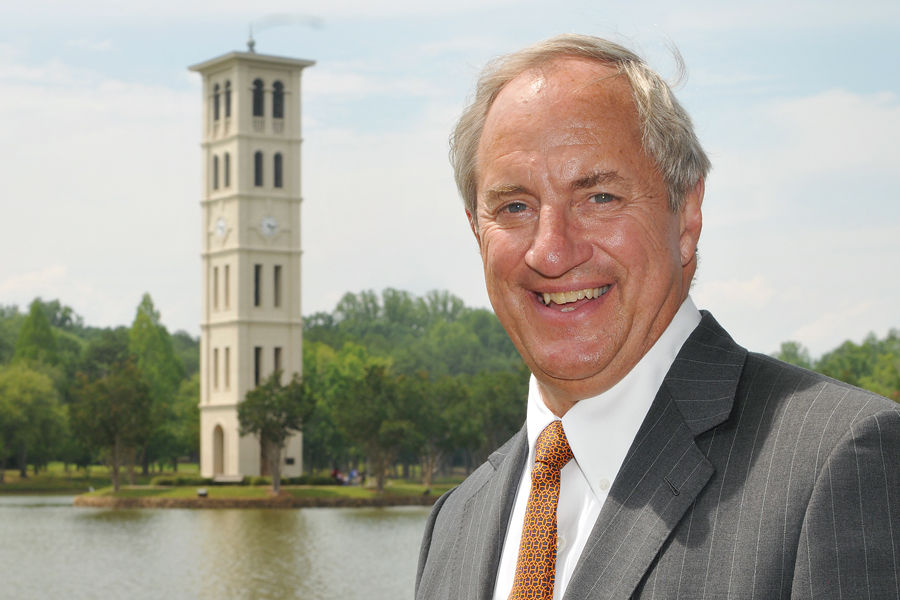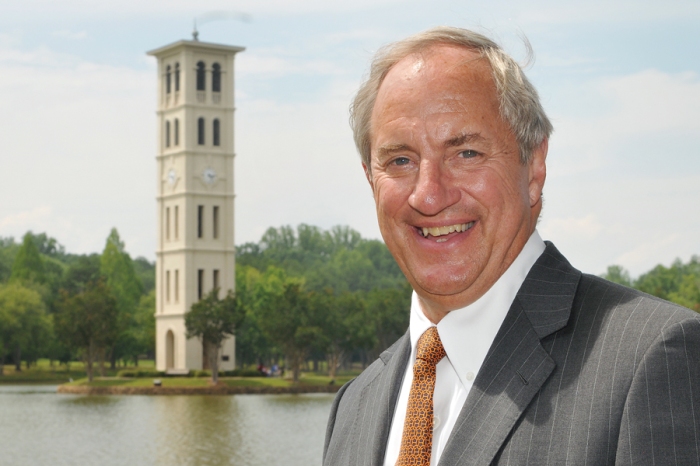President Rod Smolla surprised the Furman community in May when he announced that he was stepping down the following month, ending a rocky tenure that — at three years — stands as the shortest in Furman’s 187-year history.
Smolla, a nationally-known lawyer and first amendment scholar, became Furman’s 11th president in July 2010, but faculty suggested that Smolla struggled to fit into his role at Furman even as he sought to lead the university through an economic recession that created new financial challenges both at Furman and throughout higher education.
“Smolla worked very, very hard, but he just had a different vision,” said longtime Furman history professor Marian Strobel. “It just didn’t click.”
Smolla cited personal reasons for resigning but declined The Paladin’s request for an interview, saying that he preferred the spotlight be on interim president Carl Kohrt, who took over on June 30.
Smolla, 60, divorced his wife in 2012 after being separated for a year, according to Family Court records. His ex-wife, Michele Balderson, worked as an assistant women’s golf coach after they came to Furman but no longer works for the university.
Smolla got engaged shortly after his divorce and announced his plans to remarry in an email to the faculty, but the engagement was later called off.
During Smolla’s presidency, Furman implemented a number of controversial policy changes that raised concerns among many in the Furman community.
One of the most significant policy decisions was to cut back on financial aid and recruit more students who could afford to pay the full cost of attendance. This was coupled with the admission department’s push to increase applications and switch to a “holistic,” test-optional application process that placed less emphasis on standardized test scores as a criteria for admission.
Brad Porchard, Associate Vice President for Admissions, said the policy changes were made because Furman’s discount rate had been increasing for several years and, compounded by the economic recession, had caused the university’s operating costs to reach unsustainable levels.
He said, however, that the policy changes yielded mixed results. Applications increased, as did international and minority student enrollment, but less financial aid also meant that fewer students matriculated.
Some faculty also said they felt that new students were less prepared for Furman because admissions had adopted more generous acceptance standards to increase enrollment.
Pochard said admissions has since adjusted its approach.
Smolla’s exact role in the policy changes is uncertain as major university decisions are made by the entire Board of Trustees.
But faculty concern about the university’s direction became great enough that the Faculty Administration Liaison Committee undertook a year long review to determine whether the university’s problems were attributable to policy decisions or were characteristic of challenges throughout higher education.
The committee released its findings last spring in an internal report to faculty as well as to a few administrators and members of the Board of Trustees. While the report is not public, history professor Erik Ching, a member of the committee and one of the writers of the report, said the committee concluded that policy changes were to blame for many of the university’s admissions problems, singling out the the restrictive financial aid policy for cutting aid during a recession and making it difficult for the university to negotiate scholarship awards with accepted students.
Dean of the Faculty John Beckford acknowledged that Furman’s admissions and financial aid strategy had achieved mixed results but said it was part of Smolla’s attempt to manage rising tuition costs in an economic environment where students and their parents are questioning the value of a liberal arts education.
“I don’t think he had all the solutions,” Beckford said. “He was going through some unchartered territory.”
Beckford praised Smolla as an intelligent leader with a strong appreciation for the liberal arts. Beckford highlighted Smolla’s efforts to strengthen Furman’s ties to the community through initiatives like the Poinsett Project, Heller Service Corps, and Partners in the Arts as indicative of Furman’s educational approach in action.
“He was a walking example of a liberal arts education,” Beckford said.
Unlike past presidents, Smolla was not an alumni and came to the university as something of an outsider, though his son was a student at Furman. Strobel suggested that Smolla’s lack of “institutional memory” may have put him at a disadvantage in leading the university.
But Strobel also characterized Smolla as a hard worker and generous educator, noting that, after professor David Morgan died of liver disease last spring, he volunteered to teach his freshman seminar rather than cancel the class.
Strobel did express concern though that Smolla sometimes pursued new initiatives without fully thinking through the implications and consulting faculty, citing the acquisition of the Upcountry History Museum as an example. While she said the partnership with the museum has been successful, Smolla arranged for the acquisition before approaching the history department to ask if the faculty would assist with programming at the museum.
Economics professor Bruce Brown echoed Strobel’s concerns. He said that he felt Smolla didn’t take the time to get to know Furman before pursuing new initiatives and policies, leading the university away from its core mission.
“Many of us felt Smolla never understood Furman’s commitment to high-quality undergraduate level education,” he said.
GreenvilleOnline.com reported that Smolla has accepted a visiting professor position at the Duke University School of Law this fall and a similar role at the University of Georgia in the spring.
But while Smolla is moving on, Beckford said the challenges he faced will still need to be addressed going forward.
“They were unique challenges in an era that was unique to higher education,” he said. “And these challenges will not go away.”

